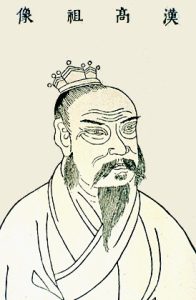46 The Han Dynasty & Innovations

When Shi Huangdi died in 210 BCE, his weak son, Qin Er Shi (r. 210–207 BCE) succeeded him but could not maintain the empire against rebellion. The rebel forces were led by the noble Xiang Yu of Chu (l. 232–202 BCE) who ennobled the commoner Liu Bang of Han as King of Han. Liu Bang accepted the surrender of the last Qin emperor, Ziying (d. 206 BCE), and treated him and his family courteously but Xiang Yu ordered them all executed.
The Qin Dynasty had misused the Mandate of Heaven to repress the people for the greater glory of the Chinese emperor and Gaozu took steps to make sure he would not make the same mistake. As a former commoner, he understood the life of the peasantry and initiated programs, such as lowering taxes and opening up bureaucratic positions to all classes, to provide people with upward mobility.
The Han Dynasty began as a kind of experiment in government as Gaozu and his advisors tried to find a balance between the overly trusting policies of the Zhou and the paranoid repression of the Qin with no model to work from. The Han inherited the vast territory that the Qin had held together with excessive brute force and that the Zhou had lost through too little. In trying to strike the perfect balance, they encouraged the concept of innovation among the people.
The Qin Dynasty had misused the Mandate of Heaven to repress the people for the greater glory of the Chinese emperor and Gaozu took steps to make sure he would not make the same mistake. As a former commoner, he understood the life of the peasantry and initiated programs, such as lowering taxes and opening up bureaucratic positions to all classes, to provide people with upward mobility.

The Han developed music theory by c. 180 BCE, the seismometer was invented in 132 BCE, paper by c. 105 BCE, the waterwheel for producing power was in use by 40 BCE. The calendar, mathematical and medical treatises, cartography, metallurgy, architecture, astronomy, and many other disciplines, concepts, and items of common and uncommon usage were invented or developed by the Han. The Silk Road created a direct link to the West, allowing for these inventions, as well as religious, philosophical, and other cultural values, to be transmitted between different civilizations.(9)
Social Changes
Although not necessarily ‘achievements’, the Han government did pass laws which resulted in several significant changes in the ordinary lives of its citizens. Universal conscription had been a feature of an unsettled China for centuries but, in 31 CE, the Han abolished it.
One of the notable changes in the family’s dealings with the state was the government’s decision to nominate and deal with only one representative of each family unit. Typically, this role went to the most senior male but it could be temporarily held by a woman if her sons were not yet of age. Family ties were strengthened by making everyone responsible for the conduct of each other member in the unit. If one family member was convicted of a serious crime, for example, then the other family members could be enslaved as a wider punishment. Another change was inheritance. Whereas previously the senior male inherited everything, the Han changed the rules to equally distribute inheritance among all male siblings. Daughters still got nothing, though, and their only hope for some financial independence was the dowry their family might provide for them.
An unfortunate consequence of the changes in inheritance was that, over time, farms became smaller and smaller as they were parceled out to brothers, and it became more difficult to support a family on a single plot. This, in turn, led to small farmers selling out and preferring to work for larger landed estate owners, eventually concentrating land ownership in fewer and fewer hands. Ultimately, the combination of the loss of tax revenue this caused, the general disaffection of the peasantry, and the increase in wealth and power of the aristocracy would lead to the overthrow of the Han dynasty and the splitting of China into three warring kingdoms.(12)
Decline of the Han Empire
Their fall was inevitable as the empire had grown too large for the central government, as it had been formed, to govern effectively. Adding to this problem was the poor character of the later Han emperors who forgot their duty to the people and saw them only as a means to fund lavish lifestyles instead of their responsibility to care for and protect.
The Period of the Three Kingdoms which followed the Han Dynasty’s fall was a time of violence and uncertainty equal in suffering to the Warring States Period. The stability and unity of the Han Dynasty would only be restored many years later by the Sui Dynasty (589–618 CE) who implemented reforms to protect against the weaknesses which led to the fall of the Han while retaining the aspects which had made the dynasty among the greatest in China’s history.(9)

